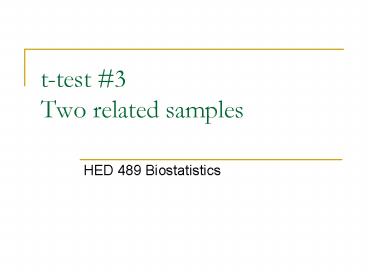ttest - PowerPoint PPT Presentation
1 / 19
Title:
ttest
Description:
... in the table below have seen a decrease in their systolic blood pressure. ... Is the mean systolic blood pressure of 20 men at risk for heart disease ... – PowerPoint PPT presentation
Number of Views:29
Avg rating:3.0/5.0
Title: ttest
1
t-test 3Two related samples
- HED 489 Biostatistics
2
- t-test 3 determines whether the mean difference
between two sets of scores for the same people is
statistically significant. This is commonly used
in "pre-test/post-test" studies where you hope to
change something about a group of people by
subjecting them to some sort of program. In the
weight loss program example, you would weigh each
person before the program started, administer the
program, and weigh each person again. What you
input into the bottom part of the t-test formula,
as you should be able to see from the formula on
the right, are these "difference" scores. This
makes t-test 3 very easy to calculate, even if
by hand. - So, what t-test 3 does is divide the standard
deviation of the difference scores into the
difference between the mean of the groups.
3
- In this example researcher want to see if the
subjects in the table below have seen a decrease
in their systolic blood pressure. Thus, subject
one had his blood pressure taken at point 'A',
have had an experimental activity (i.e.,
medication) and then had their blood pressure
taken at point 'B'. - The null hypothesis for this study is
- H0 There is no difference in blood pressure
between pre and post testing. - The alternative hypothesis is
- H1 There is a difference in blood pressure
between pre and post testing.
4
Step 1
- Step 1 is to write the scores down in two
columns, being sure to match the scores with the
subject's pre score.
Click here to see an Excel Example
5
Formula for t-test 3
6
t-test 3 Is the mean of the BP
pre-scoredifference from post-test
score? Step2 D X - Y
In Step 2, you subtract the values in the second
column, labeled "Y," from the value in the
first column, "X." Again, each X and
corresponding Y score much match for the same
pair of people. Or, if you're doing a pre-post
test, the scores have to match for the same
person. Then, you square each value.
Click here to see an Excel Example
7
Step 3
Click here to see an Excel Example
- Square the differences found in Step 2 and then
sum them. This is "square first, then sum."
8
Step 4
Click here to see an Excel Example
- Step 4 really has three parts first, you sum the
difference scores. Second, you square that value.
This is "sum first, then square." Third, you
divide that squared value by the number of
scores.
9
Step 5
Click here to see an Excel Example
- Step 5 subtracts the squared sum of the
difference scores, divided by the number of
scores, from the sum of the squared difference
scores. This is subtract Step 4 from Step 3, and
it completes the numerator under the square root
sign.
10
Step 6
Click here to see an Excel Example
- Divide the results in Step 5 by N(N-1).
- In this example, that is 107/14(14-1)
11
Step 7
Click here to see an Excel Example
- Obtain the means (averages) from both groups.
12
Step 8
Click here to see an Excel Example
- Subtract mean for Group 2 from mean of Group 1
- 93.50 97.14 -3.64
13
Step 9
Click here to see an Excel Example
- Divide value from Step 8 by value obtained in
Step 6
14
Step 10
- Figure out degrees of freedom (df)
- dfN-1 13
- Find t-table (inside back cover of Kuzma)
- Find t-value of .05 with 13 df
- 2.16
- The t-value obtained is bigger than 2.16, we can
say that there was a significant increase from
the pre-test to the post-test
15
One more thing
Pull down Tools to get to Data Analysis
16
Youll highlight t-test, paired
17
In the white/red box, click to highlight your
data make sure you click labelsthen click OK
18
Here are the results. Ive highlighted in yellow
the two key parts. Note that Excel reports the
t-value in a negative component (remember we said
at one point you can ignore the negatives). The
program also reports the probability. As you can
see, that probability is well below .05.
19
Assignment
- Is the mean systolic blood pressure of 20 men at
risk for heart disease significantly different
after a stress-reduction program? Download here































